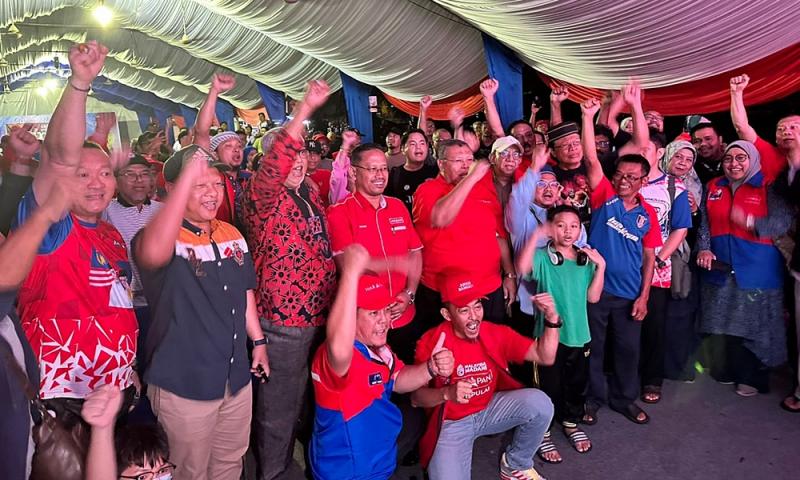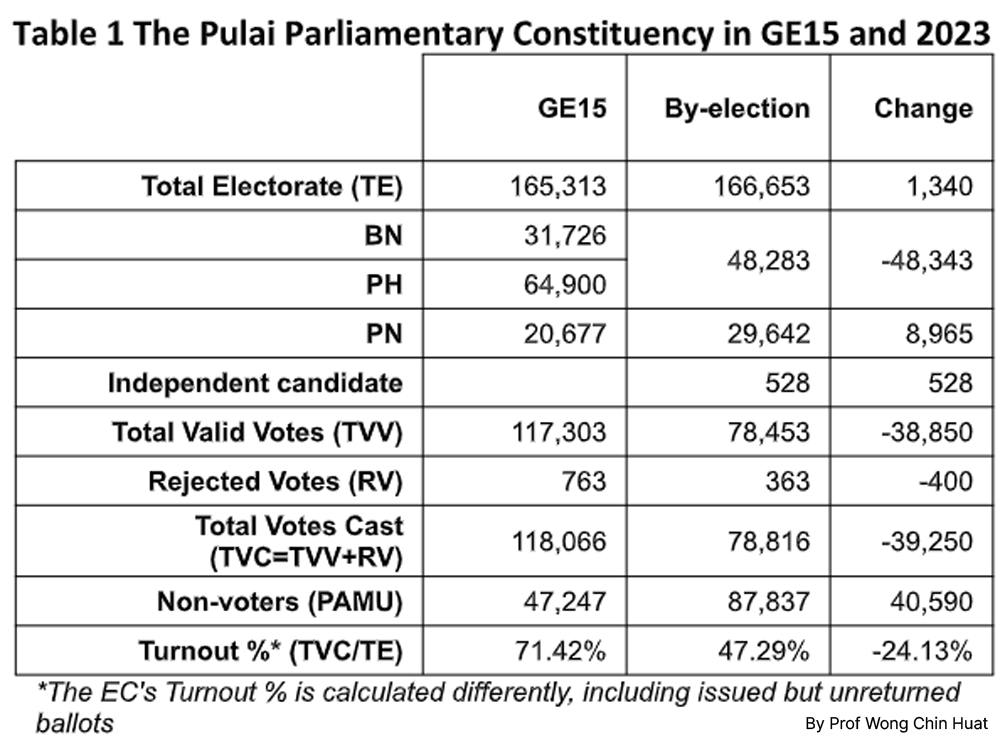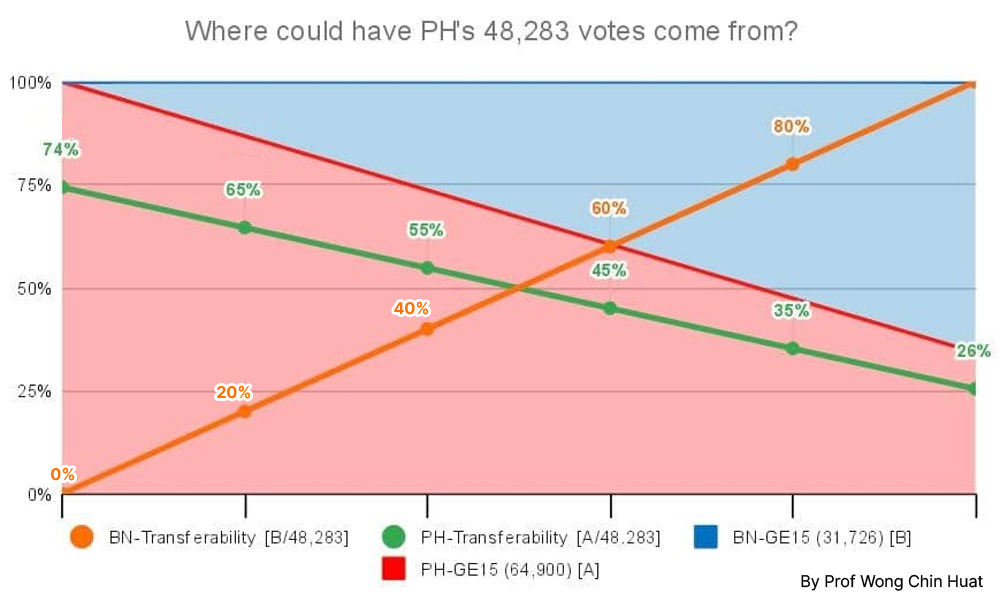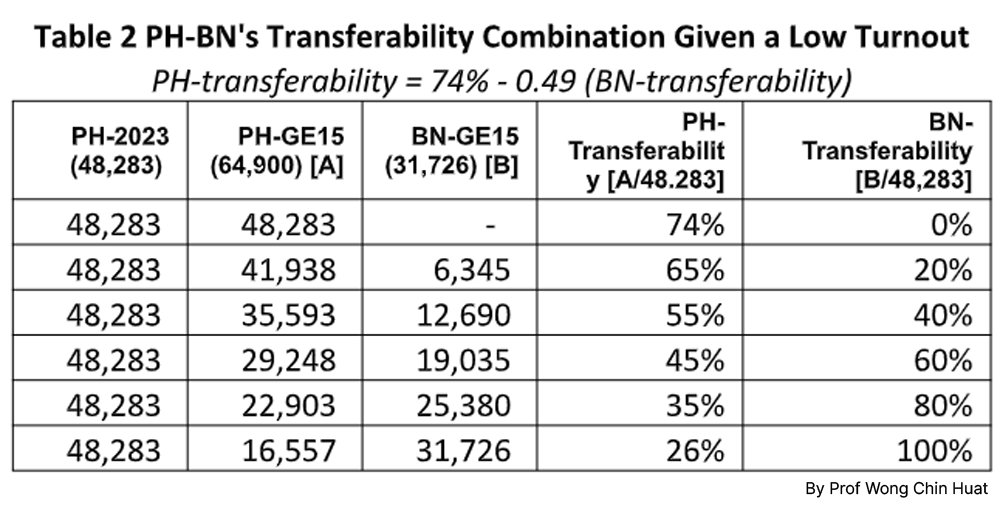
Wong Chin Huat
COMMENT | The Pulai parliamentary by-election registered a record-low turnout of 47 percent.
Yet because Pakatan Harapan retained the seat - as it did the Simpang Jeram state seat - some Pakatan Harapan-BN supporters are cheering it as a turning point for the Green Wave.
Some even think that Ahmad Zahid Hamidi’s discharge not amounting to an acquittal (DNAA) is the right political move and that Najib’s DNAA should be on the card for Umno’s revival.
Unfortunately, such optimism is not supported by numbers.
The real verdict: a substantial number of voters in Pulai slapped both Harapan-BN and PN by staying away from the poll.
The overview
If we compare the numbers of the 15th general election and the by-election, 10 months apart, here is what we get:
Harapan increased its vote share from 55.32 percent to 61.54 percent but lost 16,617 votes while PN increased its vote share from 17.63 percent to 37.78 percent with a gain of 8,965 votes.
If we combine Harapan and BN votes in GE15, 96,626, then Harapan has lost 48,343 votes. Out of 118,066 voters who cast their ballots in GE15, as many as 38,850 in net term chose not to vote.
Since PN gained 8,965 votes, this loss of 38,850 votes to abstention or Parti-Aku-Malas-Undi (Pamu) is almost exclusively Harapan-BN’s. (Table 1)
This is the real picture.
COMMENT | The Pulai parliamentary by-election registered a record-low turnout of 47 percent.
Yet because Pakatan Harapan retained the seat - as it did the Simpang Jeram state seat - some Pakatan Harapan-BN supporters are cheering it as a turning point for the Green Wave.
Some even think that Ahmad Zahid Hamidi’s discharge not amounting to an acquittal (DNAA) is the right political move and that Najib’s DNAA should be on the card for Umno’s revival.
Unfortunately, such optimism is not supported by numbers.
The real verdict: a substantial number of voters in Pulai slapped both Harapan-BN and PN by staying away from the poll.
The overview
If we compare the numbers of the 15th general election and the by-election, 10 months apart, here is what we get:
Harapan increased its vote share from 55.32 percent to 61.54 percent but lost 16,617 votes while PN increased its vote share from 17.63 percent to 37.78 percent with a gain of 8,965 votes.
If we combine Harapan and BN votes in GE15, 96,626, then Harapan has lost 48,343 votes. Out of 118,066 voters who cast their ballots in GE15, as many as 38,850 in net term chose not to vote.
Since PN gained 8,965 votes, this loss of 38,850 votes to abstention or Parti-Aku-Malas-Undi (Pamu) is almost exclusively Harapan-BN’s. (Table 1)
This is the real picture.

Zahid’s DNAA impact on Harapan-BN
Critics of Zahid’s DNAA expected Harapan to be punished by its reformist base by abstention.
However, proponents of Zahid’s DNAA argued that this would excite Umno’s base and bring votes for Harapan.
How accurate were these expectations?
We won’t know the answer without granular election data and opinion poll data for detailed analysis.
But we know enough to make smart postulations.
First, given the low turnout, Harapan could not have gained many - if any - votes from newly registered or existent voters who abstained in GE15.
Second, Harapan’s 48,283 votes would have to come from Harapan or BN. If Harapan retained much of its votes, then BN had brought little votes over. On the other hand, if BN had brought much of its votes over, then Harapan retained few of its base.
Third, we can calculate the transferability rate of Harapan and BN base to the Harapan candidate, Suhaizan Kaiat, this round.
Harapan voters who could not turn to PN had two realistic choices: Harapan or Pamu, while BN supporters had three: Harapan, PN, or Pamu.
With this information, we can make paired estimates of Harapan and BN votes that made up Suhaizan’s 48,283 votes. (Chart 1)

We can calculate the transferability of Harapan-GE15 and BN-GE15 votes to Harapan-2023, and even produce a simple formula for the trade-off:
Harapan-transferability = 74 percent - 0.49 (BN-transferability)
For any percentage of the Harapan transferability rate (say 65 percent), there would be a corresponding BN transferability rate (20 percent). And vice versa, if BN’s transferability was as high as 60 percent, Harapan’s transferability must have dropped to 45 percent. (Table 2)
Simple junior high school mathematics.

What does it mean?
Zahid’s DNAA either had hurt Harapan’s base badly or had not called back a lot of BN voters. Harapan-BN cannot escape both these depressing conclusions. Pick one.
So, do you still want to risk it with Najib’s DNAA?
A big slap on PN too
This is no less a big slap on PN too. If Zahid’s unpopularity amongst the Malays had helped PN to gain ground, his DNAA should have pushed more votes toward PN.
When PN aimed to deny Anwar his two-thirds majority in Dewan Rakyat, and with all its double-down of toxic ultra-right narratives by PN chairperson Muhyiddin Yassin, PAS president Abdul Hadi Awang, and former prime minister Dr Mahathir Mohamad, its gain of a mere 8,965 votes is a defeat.
Most of the 31,726 BN voters in GE15 had gone to Harapan or Pamu.
This limited transferability rate from BN to PN, 28 percent, is likely both a success of Umno Johor in holding its ground and a failure of PN in reaching the middle ground with Malays.
If Muhyiddin, Hadi, and Mahathir continue with their takfiri (excommunicate) and anti-minority narratives, they may find more middle-ground Malays turning to Pamu.
I hope both sides get more sober after Pulai.
WONG CHIN HUAT is a professor and deputy head (strategy) of the Asia headquarters of the UN Sustainable Development Solutions Network at Sunway University, Malaysia. He declares no conflict of interest.

No comments:
Post a Comment